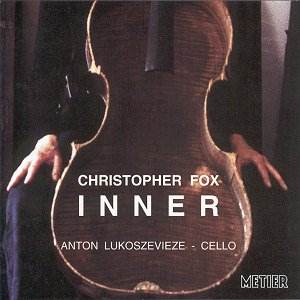When, as the booklet notes tell us, one commentator describes Christopher Fox’s music as "complex" and another as "minimal" we know we are dealing with a composer whose work is not easy to classify. Yet despite the stylistic paradox of these two descriptions, after listening to this disc I began to see the reasons for the apparent conflict of opinions on Fox’s music. There are without question elements of repetition in all of these works for solo cello although I would certainly not apply the label of 'minimalist', for Fox combines this repetition with an intuitive use of extended technique which in these works at least, demonstrates an impressive, sometimes extraordinary, understanding of what can be achieved on the instrument. It is this use of extended technique that is the "complexity" of the music, the repetition serving to bind the music together structurally in a way that some listeners may find strangely satisfying for so called "avant-garde" or experimental music. As a result, Fox achieves a huge range of expression in his work, from the dense, ritualistic opening of chant suspendu via an apparent ethnic influence in Straight lines in broken times³ (the composer denies the influence of Gamelan music in a booklet interview) to the hypnotic, contrasting simplicity of inner, a work which at forty five minutes, imposes tremendous pressure on the concentration of the listener, let alone the performer.
The above points, allied with the fact that Fox’s music constantly reinvents itself, means that his work will, I suspect, always divide opinion. Certainly in the case of inner however, I found that patience and concentration did begin to reap rewards although I would readily admit that I did not think this was likely to be the case after my first aborted listening. I would strongly recommend that prior to listening the booklet for this work be read carefully, as well as the enlightening interview with Richard Ayres that follows it, for together they hold the key to a greater understanding of Fox’s musical philosophy. Essentially, the work is an exploration of the relationship between performer and audience. Fox explains that he is fascinated by the intimacy of this relationship, whether the performer be a musician, stand-up comedian or storyteller. The relationship is developed, quite literally, via a series of thirty related sections collected into "family trees" as the composer puts it and tracked separately on the disc for ease of navigation. The result is a work that will be revered by some and detested by others, with little room for fence sitting I suspect. What is undeniable is that whatever your feeling towards it, the piece has a sense of structure that is in itself something to be admired in a contemporary work for solo instrument on this scale.
The other three (much shorter) works on the disc are all explorations of the technical and micro-tonal tuning possibilities of string instruments, encompassing such areas as timbre and sonority through bowing as well as pitch relationships as a result of retuning. I say string instruments as opposed to cello for certainly in the case of Generic Compositions #3, #4 and #5, the work is intended for any four stringed instrument, specified as plucked in #3, bowed in #4 and sliding in #5. Straight lines in broken times is concerned with the scalic possibilities arising from the retuning of the cello, the predominant interval here being three-quarters of a tone. This allows Fox to modulate by way of quarter or semitones to other three-quarter tone scales possible within the equal tempered tuning system. It sounds complicated and it is but the outcome is a work that in spite of its daunting compositional premise both technically and "melodically", is surprisingly approachable. In many ways Chant suspendu is the toughest work on the disc to get to grips with. Originally written for cello and piano, this version dispenses with the piano in favour of a computer- generated "particle" of the piano part to create a kind of drone throughout the work. The teeming, dense, sound world resulting is unlike anything else on the disc. It is also another tremendous challenge to the cellist, Anton Lukoszevieze, who remarkably recorded this performance in a single take.
Metier is giving Christopher Fox deserved support with this second release of his music on the label. In terms of the performances Anton Lukoszevieze is as fine an advocate of Fox’s music as the composer is ever likely to get and it is good to know that Metier plan further releases featuring both Lukoszevieze and his ensemble Apartment House. The recorded sound is excellent and the booklet notes by the composer himself invaluable.
Music then that will always provoke stimulating differences of opinion, but all the more valuable for it.
Christopher Thomas


